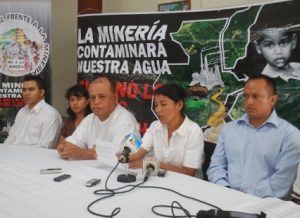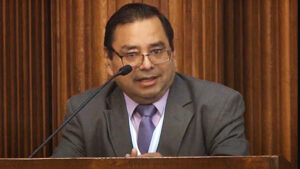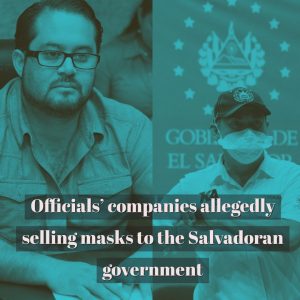Politics
Two financial blows from the Salvadoran Government
CONTEXT
The U.S. Embassy recently approved funding for organizations working in the region, through USAID.
The relationship of the Salvadoran government and the US Government is not “solid”, as stated by the Chargé d’ affaires ad Interim Jean Manes:
“We have investments in different projects. USAID support is in the hundreds of millions in different projects of agriculture, water, education with unions, technical universities that are preparing young people for the future”.
“We believe in our relationship, we want the best, but we just can’t look the other way when there is a decline in democracy,” she said.
Regarding the request made by the Minister of Labor, Rolando Castro, (at the beginning of November) to “leave the country because she has already caused a lot of damage”, Manes replied that “this is a job of the Ministry of Foreign Affairs” and added that The temporary work visa program for Salvadorans was transferred by President Bukele from the Ministry of Labor to the Foreign Ministry “because it did not work” and it is intended that more Salvadorans may have the opportunity to work temporarily in the United States legally.
Another point of contention is the halted extradition of several MS-13 leaders:
“Today we have more than 13 people who are not facing justice and that is unfortunate. There is the case of a woman, been kidnapped by someone, leaving her dead, and this person is not facing justice (and) it is because he is not being sent to the United States in a form of extradition, as it should be in accordance with the treaty that we have had for more than 100 years,” said Manes.
You can read more about this here.
FODES
FODES (Fund for the Economic and Social Development of Municipalities) is a sum that the mayor offices use to improve the infrastructure of their municipalities and more projects for the benefit of the community. Many municipalities use this money to pay the loans they make when they build streets, bridges, fields, etc … But some use it to pay employees’ salaries. (SOURCE).
Towards the February elections in 2021, the Constitutional Chamber had ordered Alejandro Zelaya, Minister of Finance, to immediately pay this to the municipalities. They had not received those funds for eight months.
After months of speculation, yesterday the Legislative Assembly approved the reduction of this amount.
CONTRAPUNTO reports:
The Legislative Assembly approved (…) a new law, which reduces the funds of the municipalities from 10% to 1.5% of the net current income of the state budget.
With this action, the municipalities are left without resources to invest in works that their communities request of them, since they lose their autonomy, a situation that violates the Constitution, as pointed out by opposition deputies and lawyers.
According to the Joaquín Montano, from the Ministry of Finance, they leave 25% of the income for operation to the mayor offices and transfer the 75% destined to the works.
“…The other 75% destined for infrastructure will always be destined for that 75%,(…) but it will be administered by the National Directorate of Municipal Works. They will be in charge of ensuring that these resources are well invested in infrastructure and projects of social benefit projects”
According to the official, the municipalities “will no longer have to face the payment of the debts they currently have” because the Ministry of Finance will assume the $ 629 million that the 262 municipalities of the country currently owe.
Deputy Christian Guevara, who chairs the Finance Commission, assured that this law was more than 30 years old.
“I am going to show you all the transitory provisions since October 12, 1995… In addition to the interpretations so that things such as garbage collection, debt payments, current expense payments, personnel hiring will be paid. All these extortions that occurred are being removed (…) this was a recurring way of make business under the table: “I will grant you this and we will negotiate something” said Guevara.
Guevara’s company AIRE FRIO has also been accused of receiving contracts from the government in the middle of the pandemic.

“The proposal of the new Fodes Law will make the country’s mayors eliminate university and highschool scholarship programs, medical assistance, aid for emergencies, sports activities, donations of coffins, deliveries of food packages, community water projects …”, twetted the mayor of San José Villanueva.
A financial blow to NGOs with the Foreign Agents Law
As reported by EFE:
At the direction of President Nayib Bukele, the Minister of the Interior of El Salvador, Juan Carlos Bidegain, presented to Congress on Tuesday a proposal for a Law on Foreign Agents to supposedly prevent “interference.”
Bidegain indicated, according to a congressional statement, that this law has “the goal of establishing a legal regime applicable to natural or legal persons, national or foreign, whose activities within El Salvador respond to interests or are financed directly or indirectly by a foreigner”.
He assured that this is “in order to promote transparency regarding this type of organizations in El Salvador.”
In the aforementioned bulletin it was indicated that “transparency in these operations will combat corruption, by preventing financiers with political interests from covering up under the term of ‘donation’ the money destined for front organizations that do not benefit the population, but rather a small sector”.
You can read how NUEVAS IDEAS refused to reveal the name of their donors here (IN SPANISH)
“With this law, foreign interference is explicitly prohibited and foundations and front NGOs are prevented from disguising as a donation what is clearly foreign interference” said the minister.
The deputy and head of the legislative group of the ruling New Ideas (NI), Christian Guevara, received the proposal and pointed directly to organizations such as the National Development Foundation (FUNDE) and the non-governmental Cristosal to receive “millions of dollars per year without the origin or destination of the funds is known”.
CRISTOSAL has had a leading role in the investigation of the Mozote massacre, which has been once again obstructed by the current administration.
“This law will prevent foreigners from giving money to political parties. It is a law in force in first world countries and in consolidated democracies. This is a clear sign that we are fighting all forms of corruption,” added Guevara.
Journalists and human rights defenders have compared Bukele’s initiative with the Foreign Agents Regulatory Law, approved in Nicaragua in 2020.
The initiative was introduced to the agenda of the Legislative Assembly with the votes of 63 deputies of the ruling party for it to be studied by a commission.
#ENVIVO | "Muchas de estas ONG hablan de transparencia, ahí está Funde, Cristosal… hoy por primera vez van a transparentar.. Esta ley no afecta a donaciones o actividad que tenga como beneficio social a los salvadoreños": Christian Guevara, diputado de NI.
— La Prensa Gráfica (@prensagrafica) November 10, 2021
This proposal comes just five days after Bukele indicated that the United States will finance social organizations that in his opinion are the “political opposition.”
“What would the United States Government say if we financed its political opposition? Because that is what these NGOs do, and everyone knows that” the president posted on Twitter.
The Salvadoran president accompanied his message with a publication of a local media in which it is reported that the United States Agency for International Development (USAID) will allocate 300 million dollars to organizations in El Salvador, Guatemala and Honduras.
These resources will be delivered in the next five years to organizations that seek to provide opportunities in the countries of origin to prevent irregular immigration.
The content of this proposal
Some of the articles worth discussing are:
Art. 3 – Any natural or legal person, national or foreign, who, within El Salvador, carries out activities that respond to interests, are controlled or financed, directly or indirectly by a foreign principal, are obliged to comply with this law.
Natural or legal persons that, depending on the object and parameters of this Law, are classified by the Registry of Foreign Agents (RAE) are subject to this law, including non-profits and foundations.
Art. 5 – This law will not be applicable to:
a) Diplomatic and consular missions, International and Regional Organizations, International Cooperation Agencies, Humanitarian assistance organizations, as well as those working for health and its personnel;
b) Any natural or legal person who participates or agrees to participate in religious, health, school, academic or scientific activities in good faith or in the fine arts.
(…)
It is important to notice that PROVIDA, attacked by Nuevas Ideas deputies, has worked to provide clean water to rural communities and that CRISTOSAL, another clear target, has worked to provide humanitarian assistance to those who have suffered of internal displacement, a problem denied for long by the Salvadoran State. They have also supported those affected by disappearences, a severe problem denied by the current Ministry of security.
Ministro de @SeguridadSV, @Vi11atoro: "No existe un aumento en los desaparecidos, solo es una campaña en contra de autoridades de seguridad, por intereses políticos que no tuvieron nunca el interés de resolver los problemas de seguridad".
Foto: @ComunicacionSV pic.twitter.com/eIgPVEiG3m
— Telenoticias21 GMV (@TN21sv) November 8, 2021
Art. 9 It is forbidden to obliged subjects according to this Law:
a) Act as a foreign agent or carry out activities included in this Law as an obligated subject, without being registered in the RAE.
b) Carry out activities for political or other purposes, with the aim of altering public order, or that endanger or threaten national security, social and political stability of the country.
c) Use donations to finance activities not previously declared in the RAE or that do not correspond to the aims or objectives established in the instrument of constitution or respective statutes.
d) Change the stated purpose for which they received the funds, without prior notice to the Registry of Foreign Agents.
(…)
Art. 10 For each financial transaction, disbursements, transfers or any other and that come from funds of the foreign donor, whether through donations, payments or other, a 40% tax will be applied.
(…)
Art. 11 When an obliged subject fails to comply without justified and proven cause, any term provided in this Law or the terms established to present corrections or others indicated by the Registry based on the regulations issued, they will receive a fine of up to TEN THOUSAND DOLLARS OF THE UNITED STATES OF AMERICA; in addition, to request the cancellation of its legal status to the appropriate office in the case of legal persons.
You can read the entire proposal in Spanish here
We will let you know how this information is processed by the social movement, especially all the organizations that develop different activities to respond to the many needs of the communities they work on and how all of this will impact the reality of people living in rural areas of El Salvador…and, of course, our own work.




